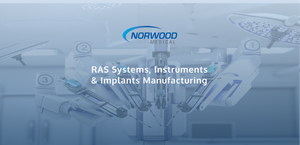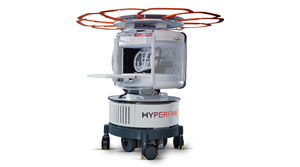August 31, 2015
Got an idea for an innovative medtech-based product, but you're not sure where to start? This is something I get asked about often when mentoring new entrepreneurs, so I put together a list of vital questions to consider before you take the plunge.
|
Geoff Rogers, PhD, is the director of IntelliMedical, which has developed a robotically steerable guidewire for use in interventional procedures. |
Growing up, my uncle had a favorite saying: "KISS!"He was referring to what's become one of my favorite acronyms: "Keep It Simple Stupid!"Why am I telling you this and what does it have to do with medical technology? Above all else, I like to keep things as simple as possible when exploring a new idea for medical technology. So here is the simplest approach to new technology planning that I know of, which is about clearly defining:
Where you are today (the "landscape").
Where you need to get to (the "destination").
How to get there (the "road-map").
Simple, right? Next you just need to ask a few specific questions to guide the process and be familiar with some basic concepts that may come across as jargon if you are new to the space. Examples of such terms include "landscaping," "road-mapping," "minimum viable product (MVP)"/"minimum loveable product (MLP)," "freedom to operate (FTO)," "de-risking," "due diligence," and so on. Don't worry if some of these terms are unfamiliar. You'll be familiar with them all after you finish this article!
Question 1: What Problem Are You Solving?
First, clearly define the problem you are trying to solve. Sounds obvious, but too many people do things completely the wrong way around. They start with a solution or part of a solution, but don't clearly understand the problem they're trying to solve. If they manage to develop their product, they then have to work hard to convince users of the value. This is "market push."What you want is the opposite: "market pull."You want your customers to be desperate for your solution.
Question 2: What Is Your MVP/MLP?
Traditionally, MVP ("viable") is the terminology that's been used, but in recent times MLP ("loveable") has gained traction. I personally prefer to use MLP, because it inspires thoughts of not just developing something that's "good enough,"but something that's worthy of being loved by users. This is key for market penetration and widespread adoption. Regardless of what term you use, the message is the same: define the minimum requirements that your first-generation product must satisfy. This represents the first product that you will sell and provide to users. For example, the first-generation iPhones came without HD cameras and fingerprint sensors. These weren't necessary for users to love them in the beginning, and piling everything into that first-generation would have significantly delayed its release, I suspect.
Question 3: Do You Have Freedom to Operate (FTO)?
Before you invest any further time, it's important to be clear on what competing products are out there, and whether anyone else is currently developing a similar solution. The most critical aspect of this is an FTO search, where you look at the intellectual property (IP) landscape. For products, this comprises a patent search. You can do it yourself to begin with, but you will need to invest a reasonable amount of time into it and think carefully about the search terms you should use. Also, the search needs to be across all jurisdictions, and include provisional and PCT patent applications (patents that are not yet granted). Hopefully this search yields only a few relevant results, with nothing that looks exactly like your MLP.
Question 4: What Technology Do You Need and From Where?
Based on your MLP, what new and/or existing technology do you need? There could be multiple things here, or just one major component. List them all. Next, see whether they exist(if you don't already know). If so, can you lift them off-the-shelf from somewhere, or are they proprietary? If the latter, this would be an example of not having FTO, in which case you would need to consider how to gain access to what you need--either via a license or some other mechanism.
For technologies that don't yet exist, you will need to invent and develop them. Obviously you will need to think about and plan how this will happen, and what will be needed to do it. This is where the technology "road-map"comes in. It creates the clearest possible path from your current location (the landscape) to your destination, seeks to identify potential risks or stumbling blocks and plans for contingencies where possible.
Question 5: Do You Have Clear Rights to Your IP?
If you're bringing existing IP to your new venture, whether it's patents, know-how or any other form, you need to ensure that you clearly own that IP. This is an especially important question for anyone who is or was employed by a similar business or research institute. If you developed the IP within the scope of your employment with that other organization, then it may have a claim to the IP. It's perhaps less obvious that, even if you developed it in your own time after hours, the organization may still have a claim. This could also potentially include people engaged to teach at an institution.
It's best to get advice on this, but if in doubt, at least seek a letter from the organization's legal department declaring that they make no claim to the IP. Whatever you do, do not skip or avoid this step. It can bite hard and your future investors will ask the question.
Question 6: What's Next?
Now that you've answered questions one to five, you should have a much clearer picture of what needs to be done next. This could include negotiating access to key proprietary technologies, starting to work on de-risking your major technical challenges, addressing skills shortages within your team, or seeking funding. Either way, now that you have a road map, in a sense all you have to do is follow it!
If you found this checklist useful, keep an eye out for my upcoming posts on exactly how to answer some of these questions.
Geoff Rogers, PhD is a medical engineer and entrepreneur, who specializes in the development and commercialization of next-generation medical devices. He has successfully cofounded and led a number of medtech companies. He is most widely known as the founder of IntelliMedical.
Learn more about cutting-edge medical devices at MD&M Philadelphia, October 7-8, 2015. |
Like what you're reading? Subscribe to our daily e-newsletter.
About the Author(s)
You May Also Like



